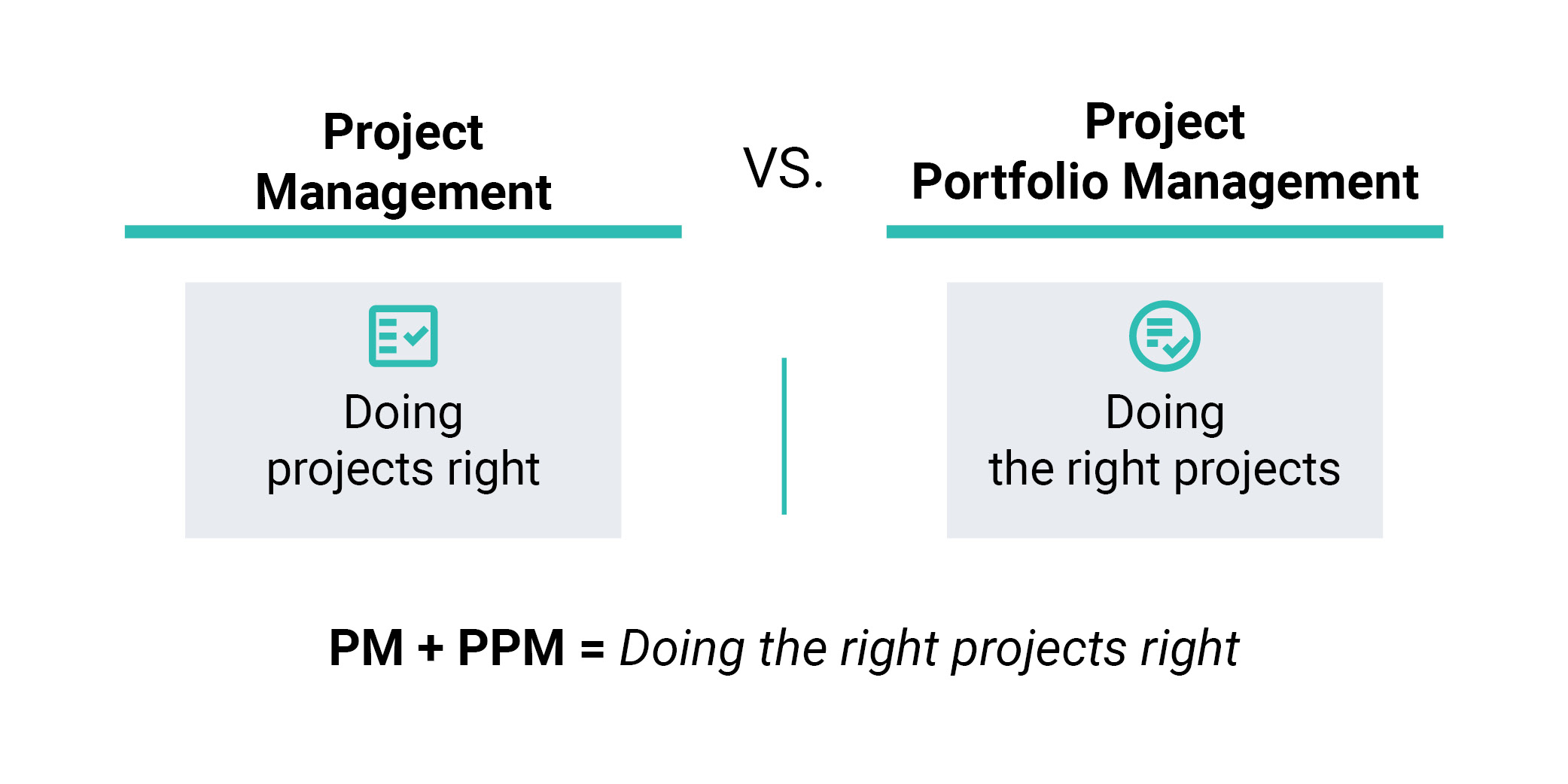If you’ve never heard of project portfolio management, you might think it’s the same as project management. Or, if you have heard of project portfolio management (PPM for short) you might not be entirely sure how it differs from project management. It’s understandable why these terms might be confusing – they are nearly the same! But there’s a big difference between project management and project portfolio management. Here’s how these two practices are different and why organizations utilize both to plan, manage and execute projects.
What Is Project Management?
You are likely already familiar with project management, but for the purpose of comparing it to project portfolio management, let’s consider its definition. According to the Project Management Institute (PMI), project management is, “the use of specific knowledge, skills, tools and techniques to deliver something of value to people.” This is a pretty broad definition of project management, so let’s also look at the definition of a project. PMI defines a project as “a temporary effort to create value through a unique product, service or result.”
To combine these two definitions, you could say project management is the use of skills and processes to successfully complete temporary work (a project) that adds value to your organization. Typically, project management includes work collaboration and task management. Projects usually include a project manager and a project team who complete the work on the project. Project managers are the people who “deliver something of value” with projects. While the exact duties of a project manager can vary by organization, common activities of a project manager can include:
- Clarifying project objectives, and assigning tasks and responsibilities
- Planning and keeping track of project timelines and detailed milestones
- Checking the progress of the project and its adherence to the timeline, budget, and requirements
- Monitoring the project’s risks
- Managing the team to success by overcoming low-level conflicts, communicating with team members and tying in key stakeholders
Successful project managers don’t just have technical skills and strategies for ensuring projects running smoothly. They also rely heavily on a number of soft skills, including team management, social competency, self-management, and stress management.
What Is Project Portfolio Management?
While project management focuses on delivering individual projects, project portfolio management (PPM) is the management of all projects in an organization from a high-level perspective. While PPM includes overseeing the processes used in project management, its real purpose is much more strategic. Project portfolio management helps organizations work on the right projects meaning every project contributes to the organization’s overall goals . Making sure an organization works on the right projects means aligning projects to specific goals, efficiently optimizing resources and prioritizing projects objectively. In PPM, a portfolio is a collection of projects grouped together to achieve specific corporate objectives. An organization might only use one portfolio for all their projects or use multiple portfolios to group projects in a way that works best for them.
Many companies use a Project Management Office (PMO) to handle all activities related to PPM. The PMO is the central hub for all projects in the business, driving PPM on a largely strategic level. If you’d like to learn more about PMOs, check out our four-part PMO series.
PPM follows a top-down approach. This ensures that important, less risky projects are implemented first and that they also have the necessary resources. The remaining capacities are then used for additional initiatives. PPM places great value on resource planning and resource conflict resolution, which in turn increases value creation in a business. PPM is often customized to the needs of each organization, but common PPM activities can include:
- Strategic alignment – selecting and prioritizing projects that align with strategic objectives
- Resource management – planning, managing and staffing human resources in terms of projects (this includes keeping up with employees’ skills and capacities as well as considering project timelines and budgets)
- Rough milestone planning – initiating, planning, implementing and completing the projects
- Training and coaching – helping project managers and other colleagues advance their project management skills
- Introduction and maintenance of PM methods – standardizing common project management practices that create consistency and efficiency across the organization
- Project portfolio controlling – monitoring and evaluating project progress
- Project support – assisting in resolving conflicts and removing roadblocks for project teams

Why Companies Use PPM
The line between project management and project portfolio management is often blurred because people attempt to accomplish all the tasks of the two under the umbrella of project management. For small companies, this might work, but for most companies, a clear line between project management and project portfolio management is needed. Project management focuses on the execution of individual projects, while PPM keeps the big picture in mind to make strategic decisions. When a company doesn’t use project portfolio management, they often fail to achieve their goals because they aren’t working on the right projects. Without PPM, a bottom-up approach consumes unnecessary resources, neglects the business strategy, and pits projects against each other in a competition that usually only has one winner.

A Note About Program Management
Many companies also choose to implement program management. A program is a group or sub-portfolio of related projects that together fulfill the same benefit or strategic objective. Program management focuses on the success of the program as a whole as opposed to the individual successes of each project. In other words, the goal of program management is to achieve the desired result for that group of projects as efficiently as possible. Program managers communicate regularly with project managers. They also coordinate with the PMO to ensure the right projects are chosen and prioritized, to identify risks, issues, and dependencies, and to find solutions in order to achieve the objective and keep the program on track.
What Is Lean Project Portfolio Management™?
At Meisterplan, we understand that implementing effective PPM can be difficult. We developed a Lean Project Portfolio Management™ framework that provides the benefits of PPM without the need for lengthy implementation times or inefficiencies. Lean PPM™ simplifies the process of PPM so it’s achievable, easy to manage, and quick to scale. It consists of four stages that all take place simultaneously:
- Strategize – translating your business strategy into criteria to compare projects and determine prioritization
- Collect – collecting and developing new project initiatives based on the strategic criteria
- Decide – deciding which projects will be implemented, and when
- Execute – managing approved projects to completion
No project portfolio management framework would be complete without software to implement it. Our Meisterplan software is your Lean PPM™ solution. Meisterplan was developed specifically to complement the Lean PPM™ framework. With features like sub-portfolios, what-if scenario simulation, interactive resource management, and built-in reporting, Meisterplan supports you and your Lean PPM™ processes, ensuring that the information you need is available whenever you need it. To see Lean PPM™ in action, schedule a Meisterplan demo.



